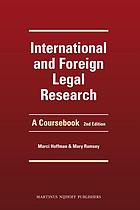"Foreign law" refers to the domestic law of a foreign nation (in our case, that means a nation outside of the U.S.)
"International law" refers to the law that governs relationships of national governments across national boundaries.
"Comparative law" refers to the study of similarities and differences between the laws of two or more countries or legal systems. It is not a type of law, but rather a method or approach to legal inquiry. When doing comparative law, you will likely need to research the law of at least one foreign jurisdiction - hence its relevance here.
For assistance deciphering a citation to a foreign source, try one of these helpful tools:
While research in foreign and international law can be fascinating and challenging, it is also endlessly varied, and as a result can be both complicated and frustrating. We strongly recommend beginning with a thorough preliminary analysis and research plan, which should generally involve the following steps:
1. Understanding the jurisdiction and/or subject area
If you don't already know the jurisdiction and/or topic well, you should start with an overview of the legal system, a basic treatise on the subject, or a reference work to get a basic understanding of the institutions, terms and concepts. This is also a good time to consult research guides and manuals for assistance on the research process.
2. Evaluating what information will meet your needs
The reality of non-U.S. legal research is that the all-access, fully-edited, Google-like Westlaw/Lexis/Bloomberg universe of U.S. law does not exist for much of the world, especially if you are researching beyond the areas of public international law or prosperous common-law jurisdictions like the United Kingdom or Canada. Outside of those exceptions, you will only rarely be able to use full-access databases to find the current law, in English translation, with helpful annotations. An important part of the research process is having realistic expectations and being honest about whether a recent summary from a solid journal article, treatise or other secondary source will be sufficient for your purposes.
3. Consulting secondary sources first
Everything that is true about starting with secondary sources for U.S. legal research is triply true for foreign and international research. Secondary sources will not only give you the necessary context for understanding the topic; they should also give you citations to key statutes, cases, and other primary materials. It's much easier to locate the law if you already have the full name of the legislation and its cite in the official gazette, case name and volume/page number of the reporter where it was published, or other relevant citation and/or identifying information.
4. Identifying sources of primary law materials
Non-U.S. primary law materials can be pretty much anywhere, from Westlaw/Lexis for some countries to stand-alone databases for others to open-access websites like the United Nations or Legal Information Institute(LII) sites. A lot of time and frustration can be saved by first figuring out where to go and how to navigate once you get there. There are many resources to help with this step, from research guides to research manuals to the Foreign Law Guide database discussed below, to "phoning a friend", which brings us to...
5. Getting help as needed
Generally, you will need more help than you would for American legal research, and you will probably need that help at more than one point in your research process. For example, after you've completed a good search of the secondary sources and come out with citations to primary law, you may need training on a specialized database or guidance on how to use the materials in print. This is normal! Reach out to a librarian at Penn or your closest law library, or to more specialized practitioners at the Law Library of Congress or the United Nations library, at any point you feel stuck or need more help using the resources.
The global network of law librarians and legal research experts has produced some fantastic roadmaps for research on foreign and international law, including both general guides and guides that are more narrowly tailored to specific jurisdictions and topics. Reading through a research guide will help you feel more comfortable with the jurisdiction or topic, and will save time on finding the right tool for the question.
Research Guides from University Law Libraries
Libraries with big foreign law collections tend to be good at producing research guides. For example, Georgetown, Harvard, Columbia and Yale. Biddle currently have guides on a number of foreign and international legal topics.
Research Guides from Other Sources
Research guides can also be found through non-university law libraries, undergraduate school libraries, international organizations, non-government organizations, and other sources. The Foreign Law Guide and GlobaLex, below, are two of the very best sources for research guides on individual jurisdictions, as well as on international and comparative law research and topics.
If you have more time or are researching a more complex problem, you should consult a more extensive manual on foreign, comparative, and international legal research for even more detail on the process and sources. A few of the most prominent research manuals are listed below.
 International and Foreign Legal Research by Marcy Hoffman; Mary Rumsey
International and Foreign Legal Research by Marcy Hoffman; Mary Rumsey